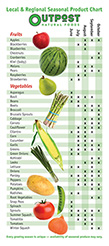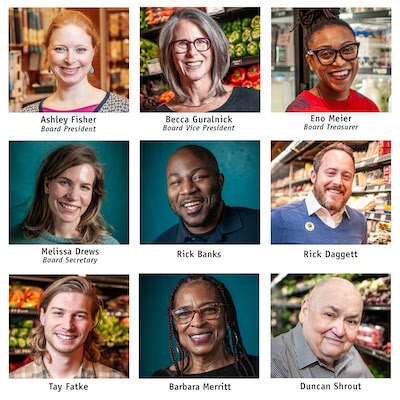What's Really in a Food Desert?

Early in September, I had the pleasure of presenting the closing keynote at the National Association of Farmers’ Market Nutrition Programs conference that took place at the Hilton City Center Hotel in Milwaukee. The morning keynote was given by Young Kim, the executive director of Fondy Food Center and Outpost Owner of the year in 2013. 
While we didn’t plan it, our presentations could not have been better coordinated.
In his morning keynote, Young talked about how the rich food traditions and culinary skills in the neighborhoods that surround Fondy Market were revealed to him through the many years of working in the community.
My presentation was about how societal narratives provide shortcuts for us to understand the world and even well-meaning attempts to advance a social good may groove negative narratives.
For example, we all know the story about how low-income neighborhoods are food deserts, which suggest that they are barren wastelands of fresh, good, or any food and that they require outside organizations to come in and help with education.
But the reality is that in many of these so-called “food deserts,” food itself and culinary traditions are a community asset. You don’t need to teach food preservation to people who are buying collard greens by the garbage bag at Fondy Farmers Market and having parties to clean, blanch, and freeze them so that they have fresh greens through the winter. You don’t have to teach cooking classes to community members who have world class barbecue recipes.
Yes, many of these communities may not have a full-service supermarket but just because they lack a market doesn’t mean that the families that live there don’t have a rich food culture. Similarly, just building a supermarket in a low-income community doesn’t solve the raft of social-economic issues and systemic barriers to opportunity that many low-income communities face.
As a term, “food desert” has captured the imagination and snuck into the vernacular because it describes a complex societal problem simply but applied broadly, it disregards the many positive aspects of food culture in these communities. Overall, this has a disempowering effect. As Young shared in his presentation, he has stopped using the term.
In my work, I’ve stopped using words like “hungry,” “vulnerable,” or “struggling” to describe the people who need food assistance. Not only do these terms create social separation, they’re also not particularly accurate since many of the families I’ve met are not “vulnerable,” but rather extremely resilient in the face of persistent challenges like having to work multiple low-wage jobs, living with health issues while not having insurance, and not having the time or resources to cook the healthy meals they know their families need.
The stories we tell and the words we use to tell them are important as they affect how we think about the people and the communities in which they live.
I am proud that Outpost is taking the time to continue to learn about food access issues in the central city from community partners like Walnut Way and Fondy Food Center. This process will provide us with the community-driven insights and perspectives that will help us understand what the community wants rather than what we think the community needs.
David Lee
Outpost Board Director
Comments
Bloggers
Archived Columns
Tags
Archives
-
April 2024 (1)
March 2024 (1)
February 2024 (1)
December 2023 (1)
August 2023 (1)
March 2023 (1)
February 2023 (1)
November 2021 (1)
September 2021 (1)
November 2020 (1)
October 2020 (1)
July 2020 (1)
June 2020 (1)
May 2020 (1)
February 2020 (1)
January 2020 (1)
December 2019 (1)
November 2019 (1)
October 2019 (1)
August 2019 (2)
May 2019 (1)
March 2019 (2)
January 2019 (1)
December 2018 (1)
November 2018 (1)
October 2018 (2)
September 2018 (1)
February 2018 (1)
November 2017 (2)
October 2017 (1)
July 2017 (2)
March 2017 (1)
February 2017 (1)
January 2017 (1)
December 2016 (2)
November 2016 (1)
August 2016 (2)
July 2016 (2)
March 2016 (2)
February 2016 (2)
January 2016 (1)
December 2015 (1)
October 2015 (3)
August 2015 (1)
July 2015 (2)
June 2015 (1)
March 2015 (2)
February 2015 (2)
January 2015 (2)
December 2014 (2)
November 2014 (1)
October 2014 (3)
August 2014 (2)
July 2014 (1)
June 2014 (2)
May 2014 (2)
April 2014 (1)
March 2014 (2)
February 2014 (2)
January 2014 (2)
December 2013 (1)
November 2013 (2)
October 2013 (1)
July 2013 (2)
June 2013 (1)
May 2013 (2)
April 2013 (1)
March 2013 (2)
February 2013 (1)
January 2013 (2)
December 2012 (3)
November 2012 (1)
October 2012 (3)
September 2012 (2)
August 2012 (4)
July 2012 (4)
June 2012 (6)
May 2012 (3)
April 2012 (4)
March 2012 (6)
February 2012 (8)
January 2012 (3)
December 2011 (4)
October 2011 (4)
September 2011 (3)
August 2011 (5)
July 2011 (7)
June 2011 (1)
May 2011 (2)
April 2011 (7)
March 2011 (10)
February 2011 (12)
January 2011 (11)
December 2010 (19)
November 2010 (13)
October 2010 (22)
September 2010 (16)
August 2010 (24)
July 2010 (33)
June 2010 (5)
May 2010 (52)
April 2010 (37)
March 2010 (55)
February 2010 (44)
January 2010 (46)
December 2009 (40)
November 2009 (26)
October 2009 (37)
September 2009 (34)
August 2009 (24)
July 2009 (21)
June 2009 (29)
May 2009 (30)
April 2009 (33)
March 2009 (16)
February 2009 (2)
January 2009 (5)
November 2008 (1)
October 2008 (1)
September 2008 (2)
August 2008 (3)
July 2008 (2)
June 2008 (6)
May 2008 (2)
April 2008 (10)
March 2008 (5)
February 2008 (5)
January 2008 (12)
December 2007 (5)
October 2007 (3)
August 2007 (3)
July 2007 (1)
June 2007 (5)
May 2007 (4)
April 2007 (6)
March 2007 (3)
February 2007 (3)
January 2007 (4)
December 2006 (2)
October 2006 (2)
September 2006 (5)
August 2006 (8)
0 (1)










